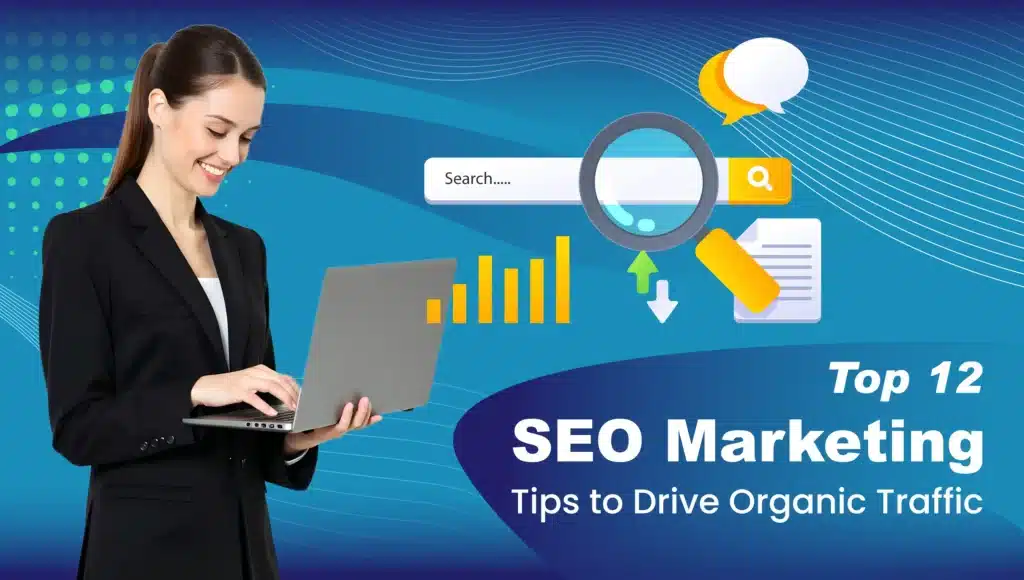Search Engine Optimization can be overwhelming, but with the Top 12 SEO Marketing Tips in this guide, you’ll have a clear roadmap to improve visibility, boost search engine rankings, and drive organic traffic. Whether you’re new to SEO marketing or refining your current SEO strategies, these proven techniques will help you grow sustainably.
1. Master the Art of Keyword Research
Without the right keywords, your content marketing efforts will miss the mark. Keyword research helps you understand what your audience is searching for and how to position your content.
-
Use tools like Google Keyword Planner, Ahrefs, or SEMrush.
-
Look for a balance of high search volume and low competition.
-
Target both short-tail and long-tail keywords.
Pro Tip: Update your keywords quarterly to match trends and search intent.
2. Optimize On-Page SEO
On-page SEO is the foundation of organic search engine optimization. Every page on your site should be optimized to rank for your target keywords.
Key steps:
-
Use your primary keyword in the title tag, meta description, and first paragraph.
-
Include secondary keywords naturally throughout the content.
-
Structure content with H2, H3, and H4 headings for better readability.
A well-optimized page can significantly drive organic traffic.
3. Focus on High-Quality Content Marketing
Content is the core of SEO marketing. Your content should provide value, answer questions, and guide users toward a solution.
Best practices:
-
Create in-depth guides, case studies, and blog posts.
-
Maintain a consistent publishing schedule.
-
Use visuals, infographics, and videos to enhance engagement.
Google rewards fresh, relevant content that meets search intent.
4. Build a Strong Backlink Profile
Backlink building is a powerful ranking factor. Search engines see backlinks as votes of confidence for your site.
Strategies for quality backlinks:
-
Guest post on high-authority sites in your niche.
-
Create shareable resources like research reports and tools.
-
Build relationships with industry influencers.
Avoid spammy links. Focus on quality over quantity.
5. Improve Technical SEO
Even the best content won’t perform well if your site has technical issues. Technical SEO ensures that search engines can crawl and index your pages effectively.
Checklist:
-
Ensure your site is mobile-friendly.
-
Improve page loading speed.
-
Fix broken links and redirect errors.
-
Submit an XML sitemap to Google Search Console.
A technically sound site improves both user experience and rankings.
6. Enhance User Experience
User experience is becoming a major ranking signal. If visitors find your site hard to navigate, they’ll leave quickly—hurting your search engine rankings.
Focus areas:
-
Simple, intuitive navigation.
-
Readable fonts and clear layouts.
-
Mobile responsiveness.
-
Clear calls to action.
Happy users are more likely to engage and convert.
7. Leverage Local SEO Strategies
If you run a local business, local SEO can be a game-changer.
Steps to optimize for local searches:
-
Create and verify your Google Business Profile.
-
Include your location in meta tags and headings.
-
Encourage satisfied customers to leave reviews.
Local SEO helps you dominate geographically targeted searches.
8. Optimize for Voice Search
With smart speakers and voice assistants on the rise, optimizing for voice queries can give you a competitive edge.
Tips for voice SEO:
-
Target conversational long-tail keywords.
-
Create FAQ sections to answer common questions.
-
Ensure your site loads quickly and is mobile-friendly.
Voice search queries often lead to higher intent actions.
9. Monitor and Analyze Performance
You can’t improve what you don’t measure. Analytics reveal which SEO strategies work best.
Key tools:
-
Google Analytics for traffic insights.
-
Google Search Console for indexing and keyword performance.
-
Ahrefs or SEMrush for competitive analysis.
Use data to refine your approach and maximize ROI.
10. Refresh and Update Old Content
Old content can lose rankings over time. Regularly refreshing it can bring back organic search optimization benefits.
Update by:
-
Adding new statistics and examples.
-
Rewriting outdated sections.
-
Improving internal linking.
Google rewards sites that stay relevant.
11. Implement a Strong Internal Linking Strategy
Internal links help search engines understand your site’s structure. They also guide visitors to related content.
Best practices:
-
Link to relevant blog posts and product pages.
-
Use descriptive anchor text with keywords.
-
Avoid overlinking from one page.
Good internal linking improves SEO marketing efficiency.
12. Stay Updated on SEO Trends
SEO is constantly evolving. What works today might not work next year.
Ways to stay informed:
-
Follow reputable SEO blogs and YouTube channels.
-
Join digital marketing communities.
-
Attend SEO webinars and conferences.
Adapting to changes ensures your strategy remains effective.
Common Mistakes to Avoid in SEO Marketing
-
Keyword stuffing
-
Ignoring mobile optimization
-
Neglecting page speed
-
Using low-quality backlinks
-
Skipping regular content updates
Avoiding these mistakes can protect your search engine rankings.
Case Study: How Zellyo Digital Increased Organic Traffic by 80% in 6 Months
A leading e-commerce client partnered with Zellyo Digital to enhance their SEO marketing strategy. By conducting an exhaustive keyword audit and optimizing on-page elements across 200+ product pages, we improved content relevance and structure. Technical SEO fixes reduced page load times by 40%, and a targeted backlink campaign earned links from top industry publications.
Result: Organic traffic surged by 80%, with a 25% increase in conversion rates within six months. This real-world example underlines the effectiveness of a multi-faceted SEO approach to drive organic traffic.
Expert Insights on SEO Marketing
John Mueller, Google’s Search Advocate, emphasizes, “Focus on creating valuable content for your users, not search engines. Relevance and quality trump tactics.”
According to BrightEdge’s 2024 report, organic search drives 53% of all website traffic, highlighting the strategic importance of SEO marketing to any digital plan.
Moz’s Rand Fishkin advises leveraging “data-driven SEO strategies that integrate user intent, competitive analysis, and continuous content improvement” to sustain traffic growth.
Final Thoughts
These Top 12 SEO Marketing Tips are designed to help you build a sustainable strategy that drives organic traffic, boosts search engine rankings, and enhances user experience.
By focusing on on-page SEO, technical SEO, and high-quality content marketing, you can create a strong foundation for long-term success. Add consistent backlink building and data-driven optimization, and you’ll stay ahead in the competitive world of digital marketing.
Remember—SEO is a long-term investment. With patience, strategy, and continuous improvement, you can turn your website into a traffic and revenue powerhouse.
FAQs
What are your top SEO tips?
Focus on keyword research, create high-quality content, optimize on-page elements, and build strong backlinks. Regularly update your site for fresh relevance.
What are the 4 P’s of SEO?
The 4 P’s are Performance, Publishing, Promotion, and Personalization—all essential for effective SEO marketing.
What are the 3 C’s of SEO?
The 3 C’s are Content, Code, and Credibility—covering content quality, technical optimization, and trust signals like backlinks.
What are the 4 pillars of SEO?
The 4 pillars are Technical SEO, On-page SEO, Off-page SEO, and Content Marketing. Together, they form a complete SEO strategy.
What helps SEO the most?
High-quality, relevant content combined with strong backlinks and solid organic search optimization helps SEO the most.
Can I do SEO on my own?
Yes. With the right tools, learning resources, and consistent effort, you can manage SEO marketing yourself.
How to rank number 1 in SEO?
Optimize your site for target keywords, improve user experience, and build quality backlinks. Keep content updated to maintain rankings.
What is the secret to SEO?
There’s no magic trick—the “secret” is consistent effort in content creation, technical SEO, and backlink building.
What is the most effective SEO?
A balanced approach that combines keyword targeting, content marketing, on-page optimization, and authority building is most effective.
What are the three steps to successful SEO?
The three steps are research, optimization, and monitoring—find the right keywords, optimize your site, and track results.
What matters most in SEO?
Relevance, quality, and user experience matter most. These drive engagement and better search engine rankings.
What are backlinks for SEO?
Backlinks are links from other websites pointing to your site. They boost your site’s authority and improve rankings in organic search optimization.


